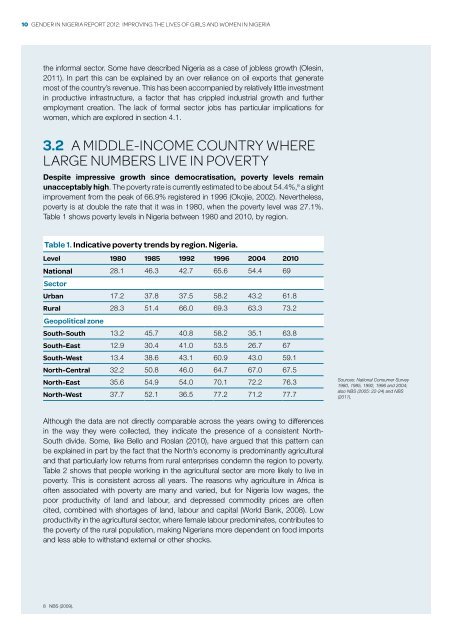Gender in niGeria report 2012 - Economic Commission for Africa
Gender in niGeria report 2012 - Economic Commission for Africa
Gender in niGeria report 2012 - Economic Commission for Africa
You also want an ePaper? Increase the reach of your titles
YUMPU automatically turns print PDFs into web optimized ePapers that Google loves.
10 <strong>Gender</strong> <strong>in</strong> Nigeria Report <strong>2012</strong>: Improv<strong>in</strong>g the Lives of Girls and Women <strong>in</strong> Nigeria<br />
the <strong>in</strong><strong>for</strong>mal sector. Some have described Nigeria as a case of jobless growth (Oles<strong>in</strong>,<br />
2011). In part this can be expla<strong>in</strong>ed by an over reliance on oil exports that generate<br />
most of the country’s revenue. This has been accompanied by relatively little <strong>in</strong>vestment<br />
<strong>in</strong> productive <strong>in</strong>frastructure, a factor that has crippled <strong>in</strong>dustrial growth and further<br />
employment creation. The lack of <strong>for</strong>mal sector jobs has particular implications <strong>for</strong><br />
women, which are explored <strong>in</strong> section 4.1.<br />
3.2 A middle-<strong>in</strong>come country where<br />
large numbers live <strong>in</strong> poverty<br />
Despite impressive growth s<strong>in</strong>ce democratisation, poverty levels rema<strong>in</strong><br />
unacceptably high. The poverty rate is currently estimated to be about 54.4%, 8 a slight<br />
improvement from the peak of 66.9% registered <strong>in</strong> 1996 (Okojie, 2002). Nevertheless,<br />
poverty is at double the rate that it was <strong>in</strong> 1980, when the poverty level was 27.1%.<br />
Table 1 shows poverty levels <strong>in</strong> Nigeria between 1980 and 2010, by region.<br />
Table 1. Indicative poverty trends by region. Nigeria.<br />
Level 1980 1985 1992 1996 2004 2010<br />
National 28.1 46.3 42.7 65.6 54.4 69<br />
Sector<br />
Urban 17.2 37.8 37.5 58.2 43.2 61.8<br />
Rural 28.3 51.4 66.0 69.3 63.3 73.2<br />
Geopolitical zone<br />
South-South 13.2 45.7 40.8 58.2 35.1 63.8<br />
South-East 12.9 30.4 41.0 53.5 26.7 67<br />
South-West 13.4 38.6 43.1 60.9 43.0 59.1<br />
North-Central 32.2 50.8 46.0 64.7 67.0 67.5<br />
North-East 35.6 54.9 54.0 70.1 72.2 76.3<br />
North-West 37.7 52.1 36.5 77.2 71.2 77.7<br />
Sources: National Consumer Survey<br />
1980, 1985, 1992, 1996 and 2004;<br />
also NBS (2005: 22-24) and NBS<br />
(2011).<br />
Although the data are not directly comparable across the years ow<strong>in</strong>g to differences<br />
<strong>in</strong> the way they were collected, they <strong>in</strong>dicate the presence of a consistent North-<br />
South divide. Some, like Bello and Roslan (2010), have argued that this pattern can<br />
be expla<strong>in</strong>ed <strong>in</strong> part by the fact that the North’s economy is predom<strong>in</strong>antly agricultural<br />
and that particularly low returns from rural enterprises condemn the region to poverty.<br />
Table 2 shows that people work<strong>in</strong>g <strong>in</strong> the agricultural sector are more likely to live <strong>in</strong><br />
poverty. This is consistent across all years. The reasons why agriculture <strong>in</strong> <strong>Africa</strong> is<br />
often associated with poverty are many and varied, but <strong>for</strong> Nigeria low wages, the<br />
poor productivity of land and labour, and depressed commodity prices are often<br />
cited, comb<strong>in</strong>ed with shortages of land, labour and capital (World Bank, 2008). Low<br />
productivity <strong>in</strong> the agricultural sector, where female labour predom<strong>in</strong>ates, contributes to<br />
the poverty of the rural population, mak<strong>in</strong>g Nigerians more dependent on food imports<br />
and less able to withstand external or other shocks.<br />
8 NBS (2009).

















